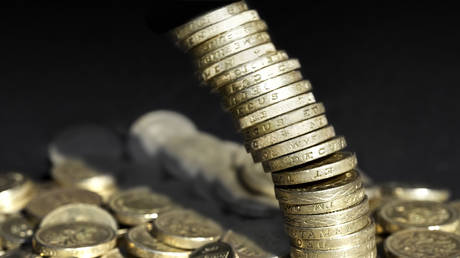Government borrowing has reached 100% of the country’s GDP, according to the Office for National Statistics
The UK’s national debt has hit 100% of the country’s annual economic output, climbing to its highest level since the 1960s, the Office for National Statistics (ONS) revealed on Friday.
Government borrowing surged to £13.7 billion ($18.2 billion) over the year to August, and reached a size equal to the annual value of everything produced in the economy, according to the ONS.
“Borrowing was up by over £3 billion last month on 2023’s figure, and was the third highest August borrowing on record,” ONS chief economist Grant Fitzner said.
The data reflects the alarming state of public finances left by the Conservatives, according to Treasury Chief Secretary Darren Jones. He warned that the Labor Party would have to make “tough decisions” to rebuild the economy.
“When we came into office, we inherited an economy that wasn’t working for working people. Today’s data shows the highest August borrowing on record, outside the pandemic. Debt is 100% of GDP, the highest level since the 1960s,” he said.
Government debt ballooned during the global financial crisis in 2008 and then again during the Covid-19 pandemic. Weak economic growth since then has also contributed to the increase in the deficit.
Read more
EU’s largest economy projected to stall
The UK’s fiscal position remains “challenging” and could “deteriorate further over the remainder of the year,” according to Matt Swannell, the chief economic adviser to the EY Item Club.
“The government will likely have to increase spending over the next few months, due to a combination of accepting the recommendations for higher pay increases from public sector pay boards and non-labor cost overruns across a range of government departments,” he said.
Rachel Reeves, the chancellor of the exchequer, earlier warned that taxes will go up in the October budget – ruling out, however, increases in rates of income, corporation, and value-added taxes.
In August, Reeves announced she would scrap winter fuel payments introduced by former UK Prime Minister Rishi Sunak at the peak of the cost-of-living-crisis, postpone plans for social care reform, and slash road, rail, and hospital investment as part of a plan to reduce borrowing.







+ There are no comments
Add yours